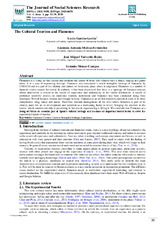The Cultural Tourism and Flamenco
Autor
García García, Lucía Rebeca
Muñoz Fernández, Guzmán Antonio
Valverde-Roda, José
Menor-Campos, Antonio
Editor
Academic Research Publishing GroupFecha
2020Materia
FlamencoCulture
Tourism
Intangible heritage
Experience
METS:
Mostrar el registro METSPREMIS:
Mostrar el registro PREMISMetadatos
Mostrar el registro completo del ítemResumen
Flamenco is a living art that excites and awakens the senses of those who witness such a dance, singing and guitar show. It is a way of expressing feelings. Flamenco was considered a world intangible heritage of humanity by UNESCO and is a part of the identity and culture of Andalucía, place where it originated. Flamenco is a symbol of Spanish culture around the world. In addition, it has been discovered that there is a typology of flamenco tourists whose motivation is related to the search of experience and authenticity in the tourist destination. A search of published scientific articles on emotional tourism, motivation and flamenco has been conducted using three databases: Web of Science, Scopus and Google Scholar. Flamenco is an art that transmits passion in each of its three components: song, dance and music. Therefore, tourism management of the sites where flamenco is part of its identity must bet on its development and potential as a motivating factor to travel, bringing the emotion to the tourist, which consists not only in perceiving it, but also in experiencing it, living it. We conclude that Flamenco as a living art forms an essential part of Spain‘s cultural heritage and becomes an important tourist factor to cover the experiential needs of tourists.

